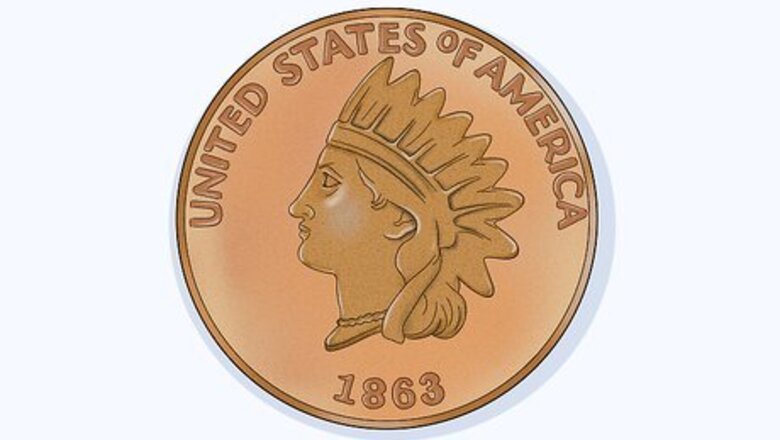
views
- Run an online search or use a coin cataloguing app to identify what kind of coin you have.
- Contact a local coin dealer or numismatics group and ask them to take a look at the coin for more info.
- Check eBay’s recently sold listings to get a reasonable sense for what consumers are willing to spend on your coin right now.
Identifying the Coin
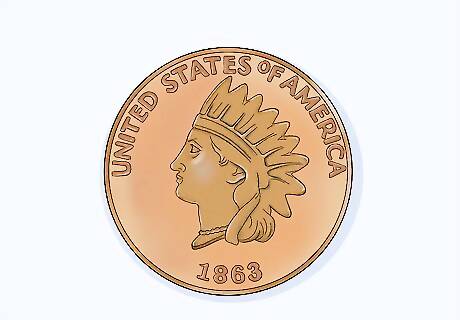
Use the year and image on the coin to run a Google search. Look for the year printed on the coin. Then, inspect the main elements of the coin. Enter your description into Google to see if your coin pops up. Scroll through the images and click around. You’ll have an easy time finding your specific coin. For example, you might search, “1956 silver coin with woman in crown facing left,” or, “old copper coin with cross and eagle on it.” If the coin isn’t in English, see if you can identify the language first. Search online to find the specific language on your coin. If there is no date on the coin and it has a really rough texture, you probably have a hammered coin, which are generally very rare and expensive. Contact an appraiser to identify the coin.
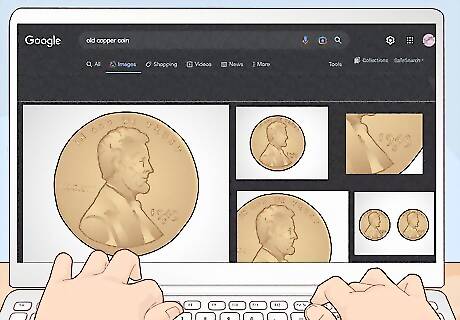
Scroll through a catalogue to find your specific coin. If you have narrowed down when or where the coin was minted given your Google search but you still can’t really tell which edition or specific mint you’re holding on to, pull up an online catalogue. Scroll through the images from that era to look for your specific coin. These catalogues are easy to find online. Numista offers a very comprehensive option.
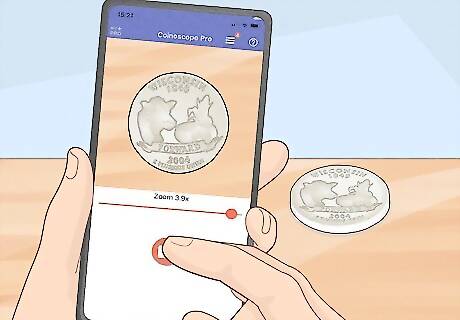
Snap a photo of the coin and use Coinoscope to identify it. Coinoscape is a free app that scans coins and searches databases to find the specific mint and price. Download the app on your phone and open it. Hold the camera over the coin and take photos of both sides. The app will pull up your specific coin. If you don’t feel like downloading an app, you can also upload a photo to Coins Catalog to reverse search for the coin. Once you have the coin identified, you may want to download the PCGS CoinFacts app. Coin collectors love this one. It contains tons of info about price, history of the coin, etc.
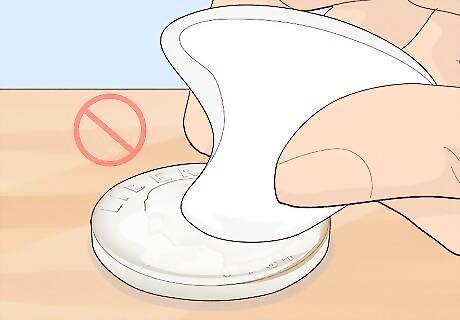
Do not clean the coin to get a better look. There’s no faster way to ruin the value of a coin than to try and clean it to remove tarnish, dirt, and whatnot. In fact, a dirty coin is often worth more than a cleaned-up version of the same coin. Just hold off on this. If you do want to have a coin cleaned, talk to an professional coin dealer or appraiser first. Some coins are indeed worth more when they’re cleaned, but it depends on how they’re cleaned.
Assessing the Coin’s Value
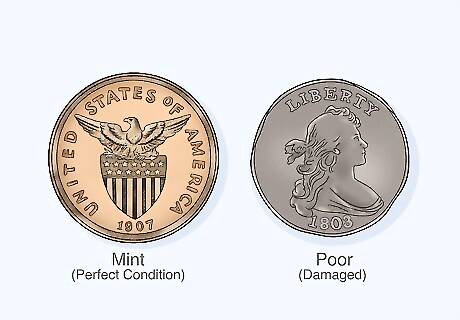
Take the condition of the coin into account. The value of a coin is greatly affected by its condition. Higher quality coins are generally more valuable than coins that are blemished or damaged. Don’t expect to fetch mint-condition prices if your coin is damaged or in poor condition. Coins that were never used are known as uncirculated coins. These tend to fetch high prices and should have very little wear and tear. Coins are rated from mint (perfect) condition, all the way down to poor (dirty or damaged).
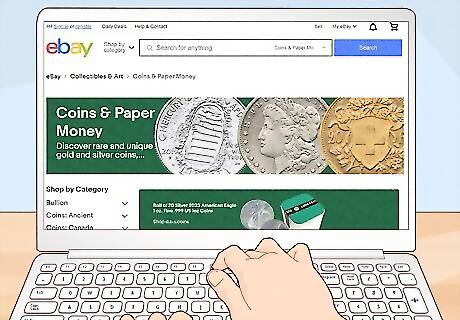
Check recent eBay’s recently sold listings for a real-world price. eBay has a dedicated section of their store for collectible coins and currency. It’s the site most coin collectors use to buy and sell their pieces. Search for your specific coin and then select the “recently sold” tab to see what people are actually willing to pay right now for your coin. People will post all kinds of wild prices to get a deal. The recently sold coins will give you a much better sense for what the market is paying for your coin.
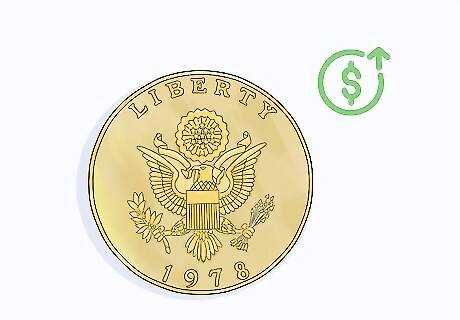
Note that a coin’s value is subject to changes in the market. The value of coins can go up and down, since they are driven by interests that can change. When lots of people want to buy a certain type of coin, the value may go up. On the other hand, sometimes the interest in a coin dissipates. Note that there are a few different prices at any given time, as well: The “book” value (a generally accepted value of the coin). The “buy” value (what a dealer would pay to buy the coin from you). The retail value (what a dealer would sell a coin to a customer for). The wholesale value (what a dealer might sell the coin to another dealer for, especially when several coins are sold together).
Working with an Appraiser
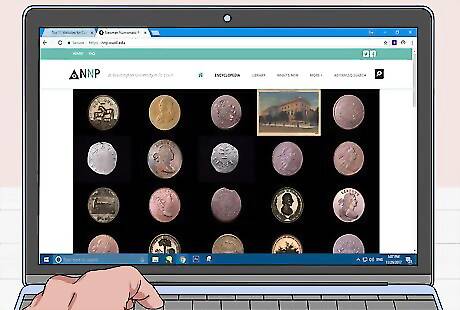
Contact your local numismatics society and ask for help. The study of coins and other money is known as numismatics, and many colleges and organizations have numismatic societies where coin experts meet. If you have lots of coins that you want to appraise, reach out to one of these clubs. They’ll point you in the right direction and help you identify the value of the coins! You can find the nearest numismatics club by looking through the American Numismatics Association directory. Don’t feel awkward reaching out to one of these clubs. Bringing old coins to a numismatic group is like bringing fresh baked goods over to Cookie Monster. They’ll enjoy helping you!
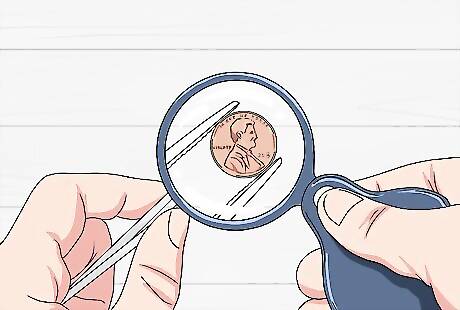
Get your coin officially appraised by a coin appraiser. Professional coin appraisers and dealers can give you the most accurate, up-to-date value of your coin. They will base their appraisal on their expert opinion of the coin’s condition. They’ll also take into account what similar coins have been selling for lately. Almost all coin dealers have the skill to appraise coins. Just don’t let them know you want to sell it ahead of time so that they give you an honest opinion. If possible, use a PCGS-certified appraiser. These coin dealers tend to be the most reputable.
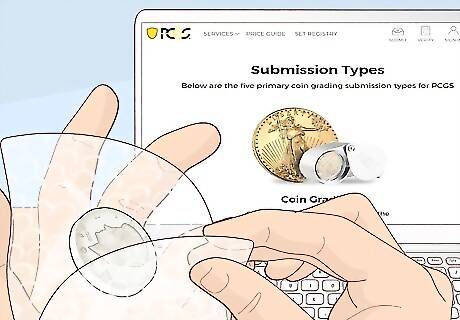
Send your coin to the PCGS or NGC to have it graded. Visit the PCGS or NGC submission pages to see how much it will cost to have your specific coin appraised. Once you choose a service, you’ll fill out a form and ship your coin to them. They’ll grade the coin, put it in a case, and ship it to you with a certified report. The PCGS (Professional Coin Grading Service) and NGC (Numismatic Guaranty Company) are the two most reputable coin grading services out there. In coin collecting, there is no alternative to these two organizations. The PCGS is generally considered much more reputable than the NGC, but their services tend to be pricier. It’s not like NGC’s appraisals are bad or anything, they just tend to be a little less thorough.



















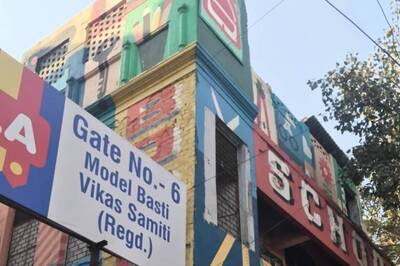
Comments
0 comment